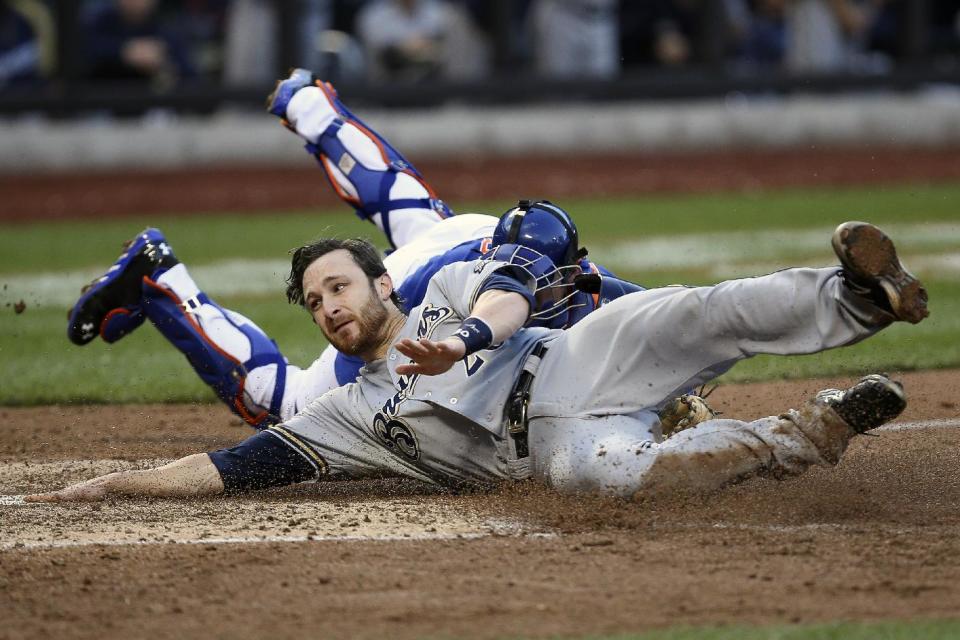What baseball's latest legislation really means

SCOTTSDALE, Ariz. – The brains and brawn of the seven easterly Cactus League teams arrived mid-afternoon Monday in groups large enough to fit in rented SUVs, here because replay is coming, and because catchers will be protected, and because the game is changing for the better.
Inside a theater in the Colorado Rockies' complex, men from Park Avenue would stand at the front of the room and explain for two hours, and soothe, and defend, and cajole, and whatever it would take to hoist the soul of the sport into the 21st century. Replay has broadened, and so have the technology and the mechanics of it, along with the choices left to a manager with already enough to think about.
[Also: Why Barry Bonds' immense presence at Giants camp makes sense]
And, just Monday, MLB and the players' union released a draft of their plan to save the catchers, which, in essence, said that catchers without the ball cannot block the plate and runners without conscience cannot go out of their way to bury said catchers. It is less a ban on collisions than it is a guideline for what can and cannot occur when two men and one ball arrive at about the same place at about the same time.
"We're trying to eliminate the vicious hits," said Joe Torre, who, along with Tony La Russa and others, spearheaded the legislation, known as Official Baseball Rule 7.13. "We'll see if we have to do more or if this gets the job done."
One participant said that about 10 percent of the two-hour meeting was spent on the new rule. The rest was on replay, and what it's going to look like, and who it will impact, and what the strategies will be. There was PowerPoint. There was conversation. One challenge per game, per manager. If a challenge were upheld, the manager would get another. If the challenges are burned by the seventh inning, challenges are left to the umpires' discretion. The process is meant to be quick and transparent and definitive, though MLB officials grant it may not be, and that the particulars of replay are likely to evolve. As to its quickness and definitiveness, we'll all find out together, including the managers, whose most frequent questions have been about the timing of the challenges – as in, the amount of time they have to request them. To that end, a challenge could come at the end of an argument, or between batters, or during a pitching change.

Fundamentally, La Russa said, "We're after the key play that may have been reversed, and correct it. And it's going to be faster than the arguments."
Asked if he is confident in the system as it stands, La Russa said, "I am. We put a lot of work into it."
As for the protection of catchers, home plate could still be a blood bath, if that's a concern, so everybody wins.
Catchers will still be in the way, if they choose. Baserunners will still try to separate them from their memories.
Rest easy; it's still baseball.
Turns out, word of a ban on home-plate collisions was somewhat exaggerated, as Monday's unveiling confirmed. They're not banned. They're not even really frowned upon.
There are rules of engagement, is all. If those get blurry (and they will), then replay – yes, replay – will sort it out.
What is banned:
• A catcher (or any other player) blocking the plate without the baseball.
• A baserunner deviating from his direct path to the plate in order to initiate contact with the catcher.
That's it.
When a catcher leaves a path to the plate, no violation. When a runner slides – charmingly defined as "the runners buttocks and legs should hit the ground before contact" – no violation.
So, we get a few more swipe tags, a few more slides, and fewer catastrophic injuries, such as concussions. That's good.
Reckless disregard for the rule, such as a baserunner going after a catcher, would not only result in the runner being called out (regardless of the play's outcome), but could bring further discipline – ejections, fines, even suspensions – from Torre.
Yes, in a game that often changes slowly, it may have been a lot to digest for the dozens in the room Monday afternoon. Off to the side, the man leaning on the cane was a reminder that this isn't simply about the players and the managers and how the rest of us plan to keep up.
The umpires, supervisor Steve Palermo said, "Are very receptive." "It's to get the play right," he said. "Believe me, nobody wants to get the play right anymore than the umpire. … I've told the umpires, use this as a gift and not a burden. You get a chance to get something right or confirm it. Either way, you're getting it right.
"Baseball's given us a chance to be perfect. Or, at least, close to perfect."

